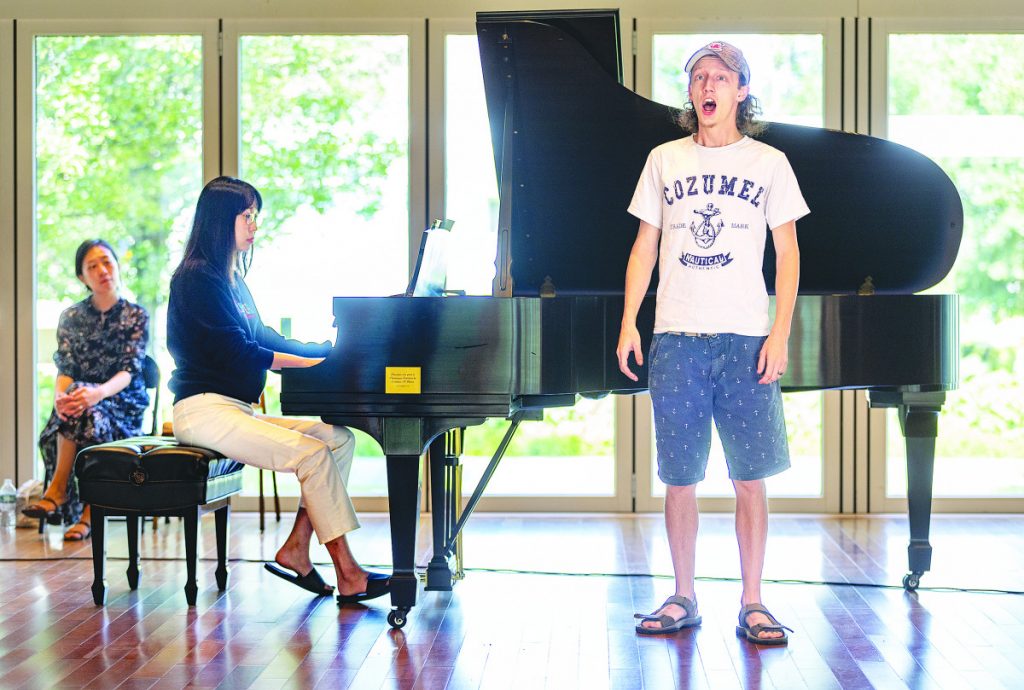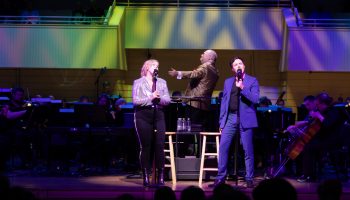ZOE KOLENOVSKY
STAFF WRITER
Combining pre-recorded interviews with live musical artistry, tonight Chautauqua’s most promising young vocalists will use a documentary approach to tell a story of opera and its performers.
Six of the Chautauqua Opera Conservatory’s students are set to take the stage at 7 p.m. tonight in McKnight Hall to deliver a series of classic and contemporary pieces through both sung and spoken word.
Marcus Shields, stage director for the show, conceptualized this vision.
“I’m always interested in a series of questions that underpin everything I do,” said Shields. “How do you listen to music, and how do you create a recital that is actively thinking about the distance between the audience and the performer in the relationship to music?”
This distance exists in the “varying degree of relationship” Chautauquans have to the repertoire of the opera recitals. In addition to the more famous pieces, Conservatory students often perform more “obscure” and “contemporary” works that are “much less known, and therefore people are encountering it for the first time,” he said.
We tried to think about every person’s perspective individually, why they chose the repertoire that they chose, who they are in their life, and what has brought them to this point.
MARCUS SHIELDS
Stage Director
Chautauqua Opera Conservatory
Shields attempts to close the gap between performer and perceiver by incorporating biographical interviews of the vocalists into the recital, interspersing live performances with clips of the students explaining their personal relation to the show’s works.
“We sat and talked about their lives, their relationship to music, their connections to Chautauqua, their connection to (Conservatory Director) Marlena Malas and the Conservatory,” he said. “We tried to think about every person’s perspective individually, why they chose the repertoire that they chose, who they are in their life, and what has brought them to this point.”
These interviews were then edited down into shorter clips that will take the place of more traditional program notes.
“There’s some kind of topography (to the selected works); it’s not explicitly thematic or chronological,” said Shields. “The thread being woven is that the audience will get to know each of these singers. … How does that impact the way you hear the song that comes next?”
Preparations for the show began barely over a week ago, as students met with Shields to select the pieces they would perform and embarked on the journey of self-discovery initiated by these reflective interviews.
“I didn’t know their voices, and I didn’t really know what each person could do,” Shields said. “I wanted to get to know them and hear the music they’d already been singing and already had a connection to, and from that pick three or four songs each that we would basically pull into a big batch of recital repertoire.”

Opera Conservatory student Austin Means, tenor, rehearses “Aprile,” by R. Leoncavallo and A. Vivanti,
with Hyerim Song on piano, Tuesday in McKnight Hall. Means and other Voice students in the Opera Conservatory will present a recital at 7 p.m. tonight in McKnight.
Sopranos Daisy Dalit Sigal, Mary Margaret McNeil and Irene Hyun Young Shin will be joined by mezzo-soprano Hope Nelson and ten- ors Jackson Allen and Austin Means on stage, with pianists Hyerim Song and Jihee Park.
In addition to the emotionally intense labor of preparing for a recital focused on their personal artistic journeys, the students performing tonight are also busy with other obligations with the Conservatory.
Shields said most, if not all, of the students involved in tonight’s recital also had roles in the Monday night performance of Suor Angelica and Gianni Schicchi in the Amphitheater.
“It’s part of the Chautau- qua Conservatory mission to surround these students with music and performance and fill their day with the actual craft of music-making and singing,” Shields said. The purpose of having “overlap- ping projects is in an effort to help them get used to that kind of rigor, which is what they would experience out in the professional world.”
The ultimate goal of the Conservatory is to facilitate the artistic development of the students in a way that al- lows them to achieve person- al and professional success.
“I help them make cleaner choices; I help them make more specific and more powerful choices,” said Shields. His goal for the evening is to guide the students in the process of discovering what story they want to tell through their art, and then to teach them how to successfully build that dramatically precise connection with their audience.
“Ultimately, it’s about ensuring whatever they want to communicate is really effectively getting out of their brain and into the world,” he said.




